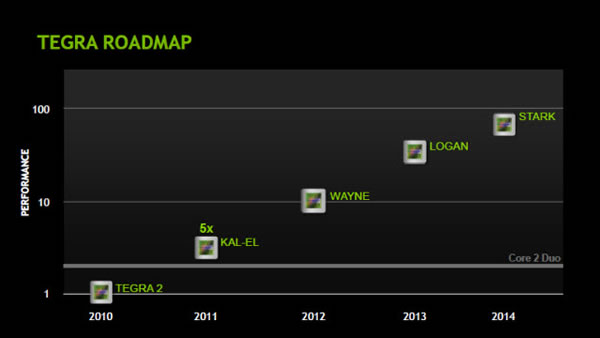I have to say I was already impressed with Texas Instruments OMAP 5 announcement and even more so with Qualcomm Quad Core Snapdragon APQ8064, but NVidia new quad core processor and their processor roadmap really blew my mind.
NVidia Kal-El Quad Core Processor
NVidia was already 1 year ahead compared to other companies with the Tegra 2, the first dual core mobile processor, so the others are playing catch up. Whereas competitors quad core will be available later this year or early 2012, the new NVidia Quad Core processor codenamed Kal-El (Tegra 3?) is already sampling and is being demo’ed at MWC 2011 in Barcelona. One the video below you’ll see a web browser benchmark (NVbench) making use of all four cores.
Kal-El also have a new Geforce GPU with 12 cores, giving 5 times greater performance than Tegra 2.
NVidia also provided benchmark results (Coremark 1.0) showing that Kal-El was faster than an Intel Core2 Duo T7200.
NVidia Tegra Roadmap to 2014
NVidia also revealed the Tegra roadmap until 2014 with other projects codenamed Wayne, Logan, and Stark, coming out in a steady one-year cadence over the next three years.

What are they going to do with Stark with a 75 times performance boost compared to Tegra 2? I’m not so sure, but they indicated their customers would now what to do with it. We’ll have to wait until around 2015 to find it in devices such as smartphones, tablets, servers? and whatever new device may come up.

Jean-Luc started CNX Software in 2010 as a part-time endeavor, before quitting his job as a software engineering manager, and starting to write daily news, and reviews full time later in 2011.
Support CNX Software! Donate via cryptocurrencies, become a Patron on Patreon, or purchase goods on Amazon or Aliexpress




